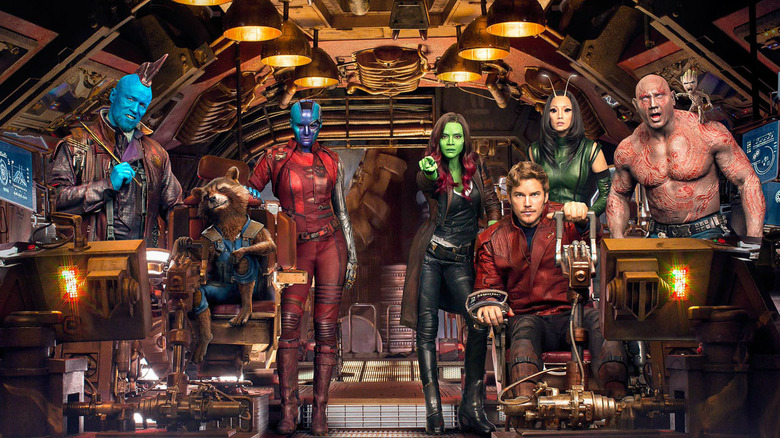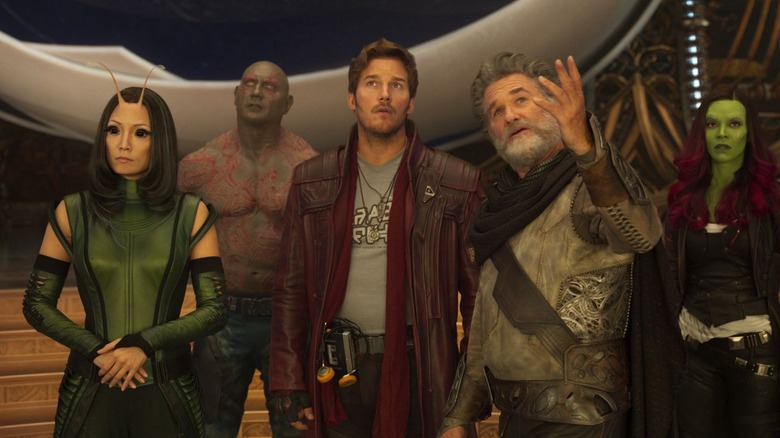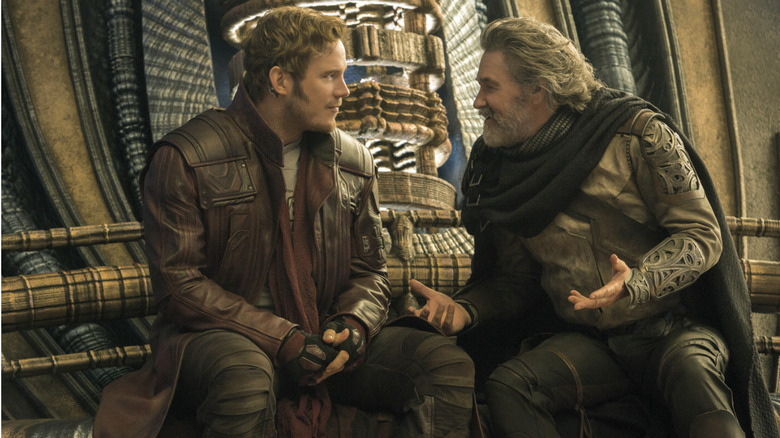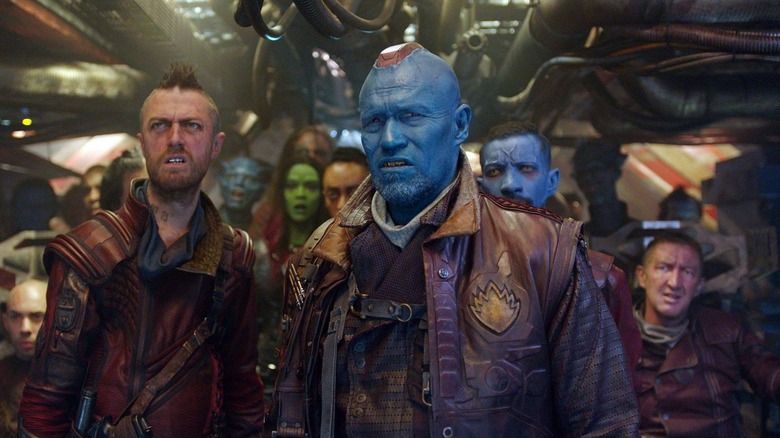James Gunn Wanted To Avoid Empire Strikes Back Comparisons With Guardians Of The Galaxy Vol. 2
I've been watching the Marvel Cinematic Universe movies again recently with my kids. This time around, I was struck by how so many conflicts in the sprawling saga are resolved by about 10 minutes of near-invincible characters throwing each other through buildings. Perhaps that's why the "Guardians of the Galaxy" films have always been my favorites; despite being set in outer space and featuring a talking raccoon and a walking tree, they feel far more down-to-earth than some of their contemporaries.
All superheroes have their backstories and inciting incidents, many of which (like Peter Parker's uncle and Bruce Wayne's parents) have been replayed so many times that they lose their potency. The Guardians were a relatively unknown quantity to most of us when they made their big-screen debut, and it was a bold move to begin the first film with a somber scene showing a young boy at his mother's deathbed. That strikingly poignant cold open gave the movie a strong emotional underpinning before all the fun kicked in.
Peter Quill and the gang might be a wacky bunch, but they're all outsiders battling with trauma, family issues, or just an aching need to fit in. These themes are mostly played lightly in an irreverent space adventure, and the sequel expanded on them even more successfully, brightening the visual palette while exploring the dark truth behind Quill's heritage. Star-Lord's budding relationship with his long-lost father inevitably invites comparisons with "The Empire Strikes Back," but that was something James Gunn specifically wanted to avoid. He even deviated from the lore of the comics in an attempt to do so.
A recap of Guardians of the Galaxy Vols. 1 & 2
At the beginning of "Guardians of the Galaxy Vol. 1," young Peter Quill loses his mom and is immediately picked up by an alien spaceship. It belongs to Yondu (Michael Rooker), the leader of a band of space pirates. The core of the film is how Quill, now grown up and calling himself Star-Lord (Chris Pratt), comes to terms with his grief and his difficult relationship with Yondu, who raised him as one of his gang. At the end of the film, it is revealed that Quill's real father is also of extraterrestrial origin.
The sequel digs much further into this. After narrowly escaping with their lives when Rocket (Bradley Cooper) steals batteries from the golden-hued Sovereigns, the Guardians crash land on a planet. There, they meet Ego (Kurt Russell), who reveals that he is Quill's father.
Ego isn't a regular humanoid at all, but a free-floating conscience that has built up an entire planet around it over billions of years. He has god-like powers that are pretty magical to Quill at first, and he is wooed by the prospect of sharing his dad's mighty cosmic abilities. But it turns out that there is a deeply sinister side to it all: Quill is one of only thousands of sons that Ego has fathered in an attempt to find a worthy heir who can help him spread out across the universe. None of the others made it, and to make matters worse, Ego also had a callous hand in the death of Quill's mother.
Meanwhile, Yondu is hired by the Sovereign High Priestess to track down the Guardians, leading to him belatedly reconciling with his adopted half-human son. It's pretty touching stuff for a movie that treats its drama with such light-hearted comic energy, resulting in an ending that is genuinely moving.
James Gunn changed the lore to avoid comparisons to The Empire Strikes Back
Ego is one of the most interesting MCU villains so far, a monstrous character who also has a great loneliness about him. Nevertheless, the idea of a powerful bad guy with space magic at his fingertips inviting his son to conquer the galaxy with him has clear parallels with Darth Vader and Luke Skywalker. Ego's identity as Peter Quill's father isn't treated like the massive reveal in "The Empire Strikes Back," but James Gunn was eager to distance his movie from the best episode of the "Star Wars" saga when it was announced at Comic-Con. He told Gizmodo:
"One of the things I impressed upon people early on is the identity of Quill's father is not the big stunner in this movie. I'm not leading it all to Darth Vader being Luke's father in the third-act reveal. This is really about the relationship between [Star-Lord] and his father, who happens to be a living planet, and his other father, Yondu, who is an abusive jerk. It's about the dysfunctional family triad that those three characters have."
To this end, Gunn made some critical changes to Star-Lord's original lore. In the comic series, Quill's father was a space king called J'Son and his mother was killed by malicious aliens aiming to end the monarch's bloodline. Those alterations no doubt upset some fans, but Gunn had his reasons:
"I didn't like that in the comics J'Son is a king, and he also reeked very much of 'Star Wars.' I like the idea of Quill's father being an ancient, cosmic, incredibly powerful being who, just like Rocket, has problems connecting to other people because ... there's nothing else like him. This character has a hard time connecting to other people because he's a god who's been alone for billions of years."
Gunn's efforts were somewhat in vain ... but that's not a bad thing
Covering ideas like insidious galactic conquest, infanticide, killing the hero's moum by planting a tumor in her brain, and the abusive relationship between Peter Quill and Yondu, it's a wonder "Guardians of the Galaxy Vol. 2" didn't turn out far darker than it did. That's all before you even get into the buried traumas of Drax (David Bautista) and Rocket and the bitter sibling rivalry between Gamora (Zoë Saldaña) and Nebula (Karen Gillen). This is where the decision to hire James Gunn as director of the "Guardians" movies really paid off. As he proved in the low-budget films where he made his name, he is very adept at balancing comedy with more troubling themes.
Despite Gunn's best efforts to distance "Vol. 2" from "The Empire Strikes Back," it still leaves us on a note that combines elements of both that movie and "Return of the Jedi." For all his failings in the past, Yondu finally makes good and sacrifices himself to save Quill, much as Darth Vader did with Luke Skywalker at the end of "Jedi." The somber yet celebratory final scene also can't help but recall the last shot of "Empire," with the heroes gazing out from their spacecraft, uncertain about the future.
Gunn shouldn't feel too bad about it because the "Guardians" series and the Skywalker saga are, at their hearts, both about family. Gunn's movies, with their preoccupation with ancestry, loss, and surrogate families, are worthy torch-bearers of these themes. For me, that's what makes "Guardians of the Galaxy" the most human and relatable of all the Marvel films.



